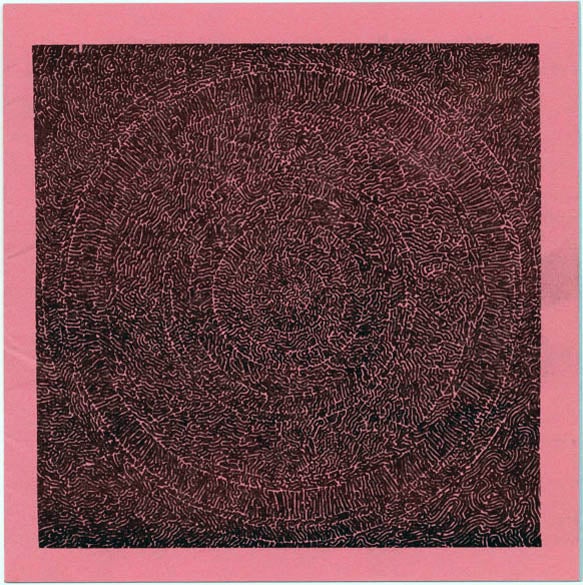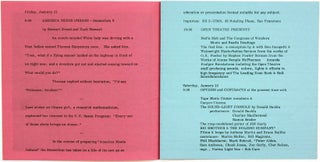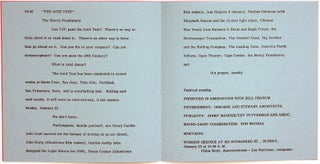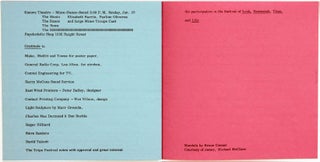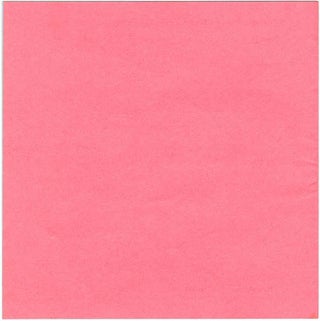1.
Original programme for the 3-day Trips Festival, held at the Longshoremen's Hall in San Francisco between January 21-23, 1966.
SF: privately printed (by Bob Carr and Wes Wilson), 1966. Two oblong sheets (one pink, one blue) folded together to make an 8pp. pamphlet. Measures 17.8 sq. cm. when folded. Cover mandala by Bruce Conner.
Parts of the programme's text were written by Stewart Brand who, together with Ken Kesey and Ramón Sender, first conceived the festival in late 1965. Their intention was to bring Kesey's Merry Pranksters (of whom Brand was an associate) and the burgeoning psychedelic scene together with the more technology-oriented approach of the media art collective USCO (with whom Brand was also linked) and the San Francisco Tape Music Center (of which Sender was a co-founder). It includes a section devoted to the Acid Test part of the festival on the Saturday night in which Brand asks: "Can YOU pass the Acid Test? There's no way to think about it or read about it. There's no other way to know than go ahead on it. Can you die to your corpses? Can you metamorphose? Can you pass the 20th Century?"
The weekend-long event was promoted by Bill Graham (he followed it two weeks later with the first of his Fillmore concerts), and opened on the Friday night with Stewart Brand and others performing his multimedia piece, 'America Needs Indians'. The following night featured an Acid Test with live music from the Grateful Dead and Big Brother and The Holding Company, while Tony Martin, Bill Ham and Gordon Ashby operated slides and and a psychedelic light show (one of the first to synch with live rock music). Other participants included avant-garde filmmakers Bruce Conner and Bruce Baillie; composers Ramón Sender and Pauline Oliveros of the San Francisco Tape Music Center; dancer and choreographer Anna Halprin of the San Francisco Dance Workshop; and, up on a balcony, Ken Kesey, dressed in a space helmet, projecting messages on acetate slides onto a wall below. Sound and light co-ordination was handled by Don Buchla (inventor of an early electronic modular synthesiser). The third evening (preceded by 'Sidetrips' earlier in the day featuring composer Lou Harrison and Prankster associate Chloe Scott) saw a second Acid Test with the Grateful Dead, as well as stroboscopic trampolinist Dan Millman, and a projected film of Jackie Kennedy on repeated loop.
Although billed as a drug-free, electronic form of psychedelic experience ("a McLuhanite Global Village/electronic art happening", as Charles Perry later described it), the Trips Festival featured plenty of Owsley-supplied acid, some of it in LSD-spiked ice-cream. For the second night, the Longshoremen's Hall was extensively wired and rigged with a range of audio-visual equipment, and the Wes Wilson-designed handbill invited the audience "to wear ECSTATIC DRESS and to bring their own GADGETS (A.C. outlets will be provided)". In a blurring of the boundaries between audience and performer, attendees were captured on closed-circuit TVs and live microphones and fed back to themselves in a techno-social loop, promoting a heightened sense of ecstatic communalism that approximated the state of disembodied consciousness, similar in effect to LSD itself.
Now regarded as the first truly multimedia event, and as an epochal moment that helped establish San Francisco as the epicentre of psychedelia, the Trips Festival also marked Stewart Brand's emergence as a cultural entrepreneur, paving the way for the Whole Earth Catalog and his later espousal of 'soft technology' and computers as tools for liberation. A Fine copy of this scarce and important document.
 Back to top
Back to top

